- Home
- Lisa Kleypas
Cold-Hearted Rake Page 2
Cold-Hearted Rake Read online
Page 2
Devon had her now. Deliberately he braced his hands on either side of the recess, blocking her retreat. He heard her breath catch, and – although he wasn’t proud of it – he felt a bolt of satisfaction at having unnerved her.
“Let me pass,” she said.
He didn’t move, keeping her captive. “First tell me your name.”
“Why? I would never give you leave to use it.”
Exasperated, he studied her shrouded form. “Has it occurred to you that we have more to gain from mutual cooperation than hostility?”
“I’ve just lost my husband and my home. What precisely do I have to gain, my lord?”
“Perhaps you should find out before you decide to make an enemy of me.”
“You were the enemy before you ever set foot here.”
Devon found himself straining to see through the veil. “Must you wear that blasted head covering?” he asked irritably. “It’s like conversing with a lampshade.”
“It’s called a weeping veil, and yes, I must wear it in the presence of a visitor.”
“I’m not a visitor, I’m your cousin.”
“Only by marriage.”
As he contemplated her, Devon felt his temper begin to subside. How small she was, as fragile and quick as a sparrow. He gentled his tone. “Come, don’t be stubborn. There’s no need to wear the veil around me unless you’re literally weeping, in which case I would insist that you put it back down immediately. I can’t abide a woman crying.”
“Because you’re secretly soft-hearted?” she asked sarcastically.
A distant memory stung him, one he hadn’t allowed himself to think about in years. He tried to shake it off, but his mind stubbornly retained the image of himself as a boy of five or six, sitting at the closed door of his mother’s dressing room, agitated by the sounds of weeping on the other side. He didn’t know what had made her cry, but it had undoubtedly been a failed love affair, of which there had been many. His mother had been a renowned beauty who often fell in and out of love in a single night. His father, exhausted by her caprices and driven by his own demons, had rarely been at home. Devon remembered the suffocating helplessness of listening to her sob but not being able to reach her. He had settled for pushing handkerchiefs under the door, begging her to open it, asking repeatedly what was wrong.
“Dev, you’re sweet,” she had said through her sniffles. “All little boys are. But then you all grow up to be so selfish and cruel. You were born to break women’s hearts.”
“I won’t, Mummy,” he had cried in alarm. “I promise I won’t.”
He had heard a laughing sob, as if he’d said something foolish. “Of course you will, poppet. You’ll do it without even trying.”
The scene had been repeated on other occasions, but that was the one Devon remembered most clearly.
As it had turned out, his mother had been right. Or at least, he’d often been accused of breaking women’s hearts. But he had always made it clear that he had no intention of marrying. Even if he fell in love, he would never make that kind of promise to a woman. There was no reason for it, when any promise could be broken. Having experienced the pain that people who loved each other could inflict, he had no desire to do that to anyone.
His attention returned to the woman in front of him. “No, I’m not soft-hearted,” he said in answer to her question. “In my opinion, a woman’s tears are manipulative and even worse, unattractive.”
“You,” she said with certainty, “are the vilest man I have ever met.”
Devon was amused by the way she enunciated every word as if it had been shot from a bow. “How many men have you met?”
“Enough to recognize a wicked one when I see him.”
“I doubt you can see much of anything through this veil.” He reached out to finger the edge of the black gauze. “You can’t possibly like to wear it.”
“As a matter of fact, I do.”
“Because it hides your face when you cry,” he said rather than asked.
“I never cry.”
Taken aback, Devon wondered if he had heard her correctly. “You mean not since your husband’s accident?”
“Not even then.”
What kind of woman would say such a thing, even if it were true? Devon gripped the front of the veil and began to hike it upward. “Hold still.” He pushed handfuls of the crepe back over the little headpiece that anchored it. “No, don’t pull away. The two of us are going to stand face-to-face and attempt a civilized conversation. Good God, you could rig a merchant ship with all this —”
Devon broke off as her face was uncovered. He found himself staring into a pair of amber eyes that tilted at the outer corners in a catlike slant. For a moment he couldn’t breathe, couldn’t think, while all his senses struggled to take her in.
He had never seen anything like her.
She was younger than he had expected, with a fair complexion and auburn hair that looked too heavy for its pins. A set of wide, pronounced cheekbones and a narrow jaw imparted an exquisite feline triangularity to her features. The curves of her lips were so full that even when she pressed them together tightly, as she was doing now, they still looked soft. Although she was not conventionally beautiful, she was so original that it rendered the question of beauty inconsequential.
Her mourning dress was slim and tightly fitted from the neck to the hips before flaring into a series of complex pleats. A man could only guess at the figure encased in all that boning and ruching and intricate stitching. Even her wrists and hands were obscured by black gloves. Aside from her face, the only visible skin was at her throat, where the front of her high collar parted with a U-shaped notch. He could see the vulnerable movement of her swallow. It looked so very soft, that private place, where a man might press his lips and feel the rhythm of her pulse.
He wanted to start there, kissing her throat, while he undressed her like an intricately wrapped gift until she was gasping and squirming beneath him. If she were any other woman, and they had found themselves in any other circumstances, Devon would have seduced her on the spot. Realizing that it would not do to stand there gaping a landed trout, he searched through his hot, disordered thoughts for some conventional remark, something coherent.
To his surprise, she was the first to break the silence. “My name is Kathleen.”
An Irish name. “Why do you have no accent?”
“I was sent to England as a child, to live with family friends in Leominster.”
“Why?”
A frown knit between her winged brows. “My parents were very much occupied with their horses. They spent several months of each year in Egypt to purchase Arabian bloodstock for their farm. I was… an inconvenience. Their friends Lord and Lady Berwick, who were also horse people, offered to take me in and raise me with their two daughters.”
“Do your parents still live in Ireland?”
“My mother has passed away, but my father is still there.” Her gaze turned distant, her thoughts chasing elsewhere. “He sent Asad to me as a wedding present.”
“Asad,” Devon repeated, puzzled.
Refocusing on him, Kathleen looked perturbed, color sweeping from her neck to her hairline.
Then Devon understood. “The horse that threw Theo,” he said quietly.
“It wasn’t Asad’s fault. He was so badly trained that my father bought him back from the man who had originally purchased him.”
“Why give a problem horse to you?”
“Lord Berwick often allowed me to help him train the young colts.”
Devon ran a deliberate glance over her fine-boned frame. “You’re no bigger than a sparrow.”
“One doesn’t use brute force to train an Arabian. They’re a sensitive breed – they require understanding and skill.”
Two things that Theo had lacked. How bloody stupid he had been to risk his neck and a valuable animal along with it.
“Did Theo do it on a lark?” Devon couldn’t resist asking. “Was he trying to show off?�
�
A glint of searing emotion appeared in those luminous eyes before it was quickly extinguished. “He was in a temper. He wouldn’t be dissuaded.”
That was a Ravenel for you.
If anyone had ever dared to contradict Theo, or refuse him anything, it had ignited an explosion. Perhaps Kathleen had thought she could manage him, or that time would mellow him. She couldn’t have known that a Ravenel’s temper usually outweighed any sense of self-preservation. Devon would have liked to consider himself above that sort of thing, but he had succumbed to it more than once in the past, throwing himself into the volcanic pit of consuming fury. It always felt glorious until one had to face the consequences.
Kathleen folded her arms tightly, each small, black-gloved hand forming a clamp around the opposite elbow. “Some people said I should have had Asad put down after the accident. But it would be cruel, and wrong, to punish him for something that wasn’t his fault.”
“Have you considered selling him?”
“I wouldn’t want to. But even if I did, I would have to retrain him first.”
Devon doubted the wisdom of allowing Kathleen anywhere near a horse that had just killed her husband, albeit inadvertently. And in all likelihood, she wouldn’t be able to stay at Eversby Priory long enough to make any progress with the Arabian.
However, now wasn’t the time to point that out.
“I’d like to see the grounds,” he said. “Will you walk with me?”
Looking perturbed, Kathleen retreated a half step. “I’ll arrange for the head gardener to show them to you.”
“I would prefer you.” Devon paused before asking deliberately, “You’re not afraid of me, are you?”
Her brows rushed downward. “Certainly not.”
“Then walk with me.”
Ignoring his proffered arm, she slid him a wary glance. “Shall we invite your brother?”
Devon shook his head. “He’s napping.”
“At this hour of the day? Is he ill?”
“No, he keeps the schedule of a cat. Long hours of slumber interrupted by brief periods of self-grooming.”
He saw the corners of her lips deepen with reluctant amusement. “Come, then,” she murmured, brushing by him to walk briskly along the hallway, and he followed without hesitation.
Chapter 2
A
fter only a few minutes in Devon Ravenel’s company, Kathleen had no doubt that every damning rumor she had heard about him was true. He was a selfish ass. A repellent, boorish rake.
He was handsome… she would give him that. Although not in the way of Theo, who had been blessed with the refined features and golden hair of a young Apollo. Devon Ravenel’s dark good looks were bold and raffish, weathered with a cynicism that made him look every bit his twenty-eight years. She felt a little shock every time she looked up into his eyes, the blue of a rough winter ocean, the vivid irises rimmed with blue-black. His face was smooth shaven, but the lower half was shadowed with a beard grain that even the sharpest razor would not completely remove.
He seemed exactly like the kind of man that Lady Berwick, who had raised Kathleen, had warned her about. “You will encounter men who will have designs on you, my dear. Men without scruple, who will employ charm, lies, and seductive skills to ruin innocent young women for their own impure gratification. When you find yourself in the company of such a scoundrel, flee without hesitation.”
“But how will I know if a man is a scoundrel?” Kathleen had asked.
“By the unwholesome glint in his eye and the ease of his charm. His presence may excite rather lurid sensations. Such a man has a certain something in his physical presence… a quality of ‘animal spirits,’ as my mama used to call it. Do you understand, Kathleen?”
“I think so,” she had said, although she hadn’t at the time.
Now Kathleen knew exactly what Lady Berwick had meant. The man strolling beside her possessed animal spirits in abundance.
“From what I’ve seen so far,” Devon remarked, “it would be far more sensible to set fire to this rotting heap of timber rather than to try and repair it.”
Kathleen’s eyes widened. “Eversby Priory is historic. It’s four hundred years old.”
“So is the plumbing, I’ll wager.”
“The plumbing is adequate,” she said defensively.
One of his brows arched. “Sufficiently adequate for me to take a shower bath?”
She hesitated before admitting, “You won’t have a shower bath.”
“A regular bath, then? Lovely. What kind of modern vessel shall I find myself soaking in tonight? A rusted pail?”
To Kathleen’s chagrin, she felt her mouth quiver with the beginnings of a smile. She managed to batten it down before replying with great dignity. “A portable tin bath.”
“There are no cast-iron baths in any of the bathrooms?”
“I’m afraid there are no bathrooms. The bath will be brought to your dressing room and removed after you are finished.”
“Is there any piped water? Anywhere?”
“The kitchen and the stables.”
“But there are water closets in the house, of course.”
She sent him a reproving glance at the mention of such an indelicate subject.
“If you’re not too delicate to train horses,” he pointed out, “who are generally not known for their discretion about bodily functions, surely you can bring yourself to tell me the number of water closets in the mansion.”
She colored as she forced herself to reply. “None. Only chamber pots at night, and an outdoor privy by day.”
He gave her an incredulous glance, seeming genuinely offended by the idea. “None? At one time this was one of the most prosperous estates in England. Why the devil was the house never plumbed?”
“Theo said that according to his father, there was no reason for it when they had so many servants.”
“Of course. Such a delightful activity, running up and down the stairs with heavy cans of water. Not to mention chamber pots. How thankful the servants must be that no one has yet deprived them of such enjoyment.”
“There’s no need for sarcasm,” she said. “It wasn’t my decision.”
They proceeded along a curving path bordered with yews and ornamental pear trees, while Devon continued to scowl.
A pair of miscreants was how Theo had described Devon and his younger brother. “They avoid polite society and prefer to associate with people of low character,” Theo had told her. “One may generally find them in East End taverns and sporting houses. Education was wasted on them. In fact, Weston left Oxford early because he didn’t want to stay there without Devon.” Kathleen had gathered that although Theo had no great fondness for either of his distant cousins, he had reserved a special dislike for Devon.
What a strange turn of fate, that this man would be the one to take his place.
“Why did you marry Theo?” Devon startled her by asking. “Was it a love match?”
She frowned slightly. “I would prefer to limit our conversation to small talk.”
“Small talk is a crashing bore.”
“Regardless, people will expect a man of your position to be accomplished at it.”
“Was Theo?” he asked snidely.
“Yes.”
Devon snorted. “I never saw him demonstrate that particular skill. Perhaps I was always too busy dodging his fists to notice.”
“I think it’s safe to say that you and Theo didn’t bring out the best in each other.”
“No. We were too much alike in our faults.” Mockery edged his tone as he added, “And it seems I have none of his virtues.”
Kathleen remained silent, letting her gaze pass over a profusion of white hydrangea, geraniums, and tall stalks of red penstemon. Before her marriage, she had assumed that she knew all about Theo’s faults and virtues. During their six-month courtship and betrothal, they had attended dances and parties and had gone on carriage and horseback rides. Theo had been unfailingly
charming. Although Kathleen had been warned about the infamous Ravenel temper by friends, she had been too infatuated to listen. Moreover, the constraints of courtship – chaperoned visits and limited outings – had kept her from understanding Theo’s true nature. Only too late had Kathleen learned a crucial fact of life: One could never truly know a man until one lived with him.
“Tell me about his sisters,” she heard Devon say. “There are three, as I recall. All unmarried?”

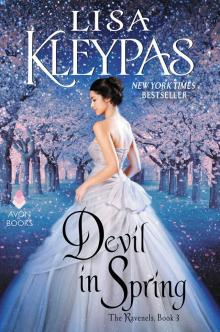 Devil in Spring
Devil in Spring Sugar Daddy
Sugar Daddy Devil in Winter
Devil in Winter Dreaming of You
Dreaming of You Christmas Eve at Friday Harbor
Christmas Eve at Friday Harbor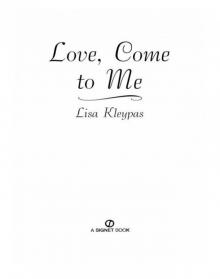 Love, Come to Me
Love, Come to Me Only With Your Love
Only With Your Love Suddenly You
Suddenly You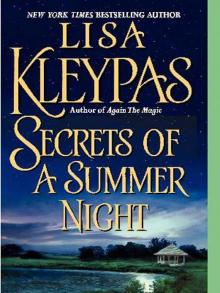 Secrets of a Summer Night
Secrets of a Summer Night Cold-Hearted Rake
Cold-Hearted Rake Where's My Hero?
Where's My Hero? Gifts of Love
Gifts of Love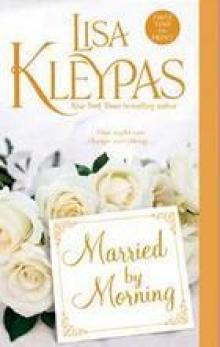 Married by Morning
Married by Morning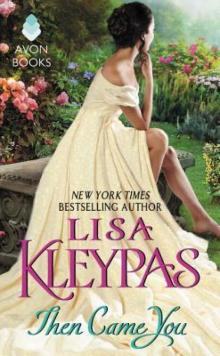 Then Came You
Then Came You Wish List
Wish List Where Dreams Begin
Where Dreams Begin A Historical Christmas Present
A Historical Christmas Present Somewhere I'll Find You
Somewhere I'll Find You Scandal in Spring
Scandal in Spring Someone to Watch Over Me
Someone to Watch Over Me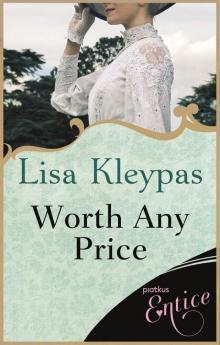 Worth Any Price
Worth Any Price Prince of Dreams
Prince of Dreams It Happened One Autumn
It Happened One Autumn Love in the Afternoon
Love in the Afternoon Devil's Daughter
Devil's Daughter A Wallflower Christmas
A Wallflower Christmas Tempt Me at Twilight
Tempt Me at Twilight Brown-Eyed Girl
Brown-Eyed Girl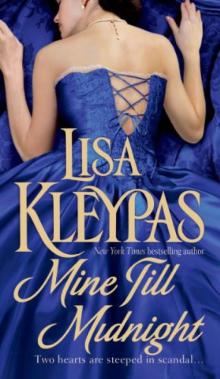 Mine Till Midnight
Mine Till Midnight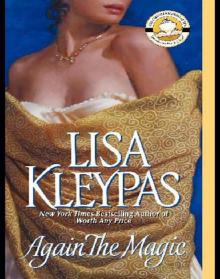 Again the Magic
Again the Magic Lady Sophia's Lover
Lady Sophia's Lover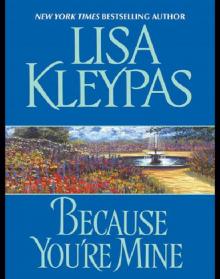 Because You're Mine
Because You're Mine Midnight Angel
Midnight Angel Smooth-Talking Stranger
Smooth-Talking Stranger Blue-Eyed Devil
Blue-Eyed Devil Hello Stranger
Hello Stranger Dream Lake
Dream Lake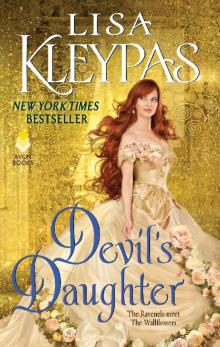 Devil's Daughter: The Ravenels Meet the Wallflowers
Devil's Daughter: The Ravenels Meet the Wallflowers A Christmas to Remember
A Christmas to Remember Smooth Talking Stranger
Smooth Talking Stranger Crystal Cove
Crystal Cove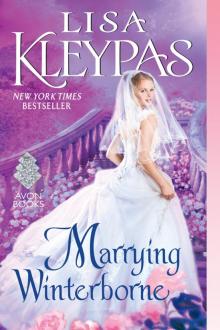 Marrying Winterborne
Marrying Winterborne Stranger in My Arms
Stranger in My Arms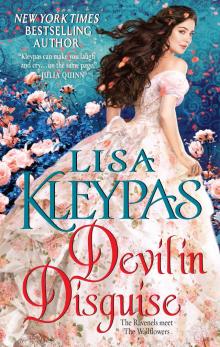 Devil in Disguise
Devil in Disguise Worth Any Price bsr-3
Worth Any Price bsr-3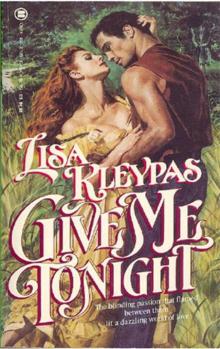 Give Me Tonight
Give Me Tonight Rainshadow Road fh-2
Rainshadow Road fh-2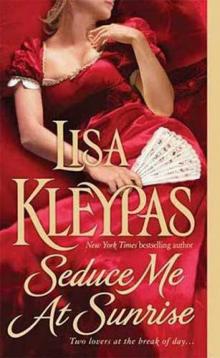 Seduce Me At Sunrise
Seduce Me At Sunrise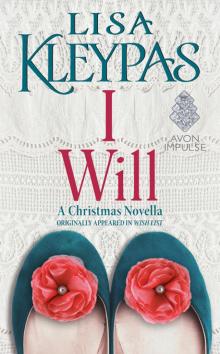 I Will
I Will Someone to Watch Over Me bsr-1
Someone to Watch Over Me bsr-1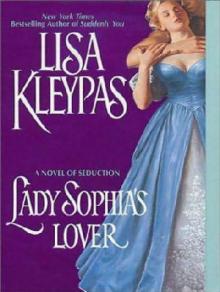 Lady Sophias Lover bsr-2
Lady Sophias Lover bsr-2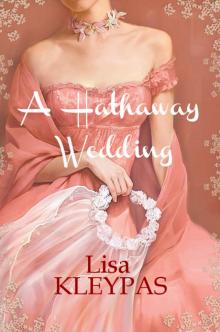 A Hathaway Wedding
A Hathaway Wedding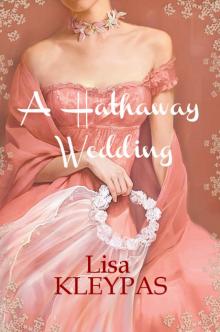 A Hathaway Wedding (Hathaways Bk2.5)
A Hathaway Wedding (Hathaways Bk2.5) Worth Any Price - Bow Street 3
Worth Any Price - Bow Street 3 Christmas with Holly
Christmas with Holly